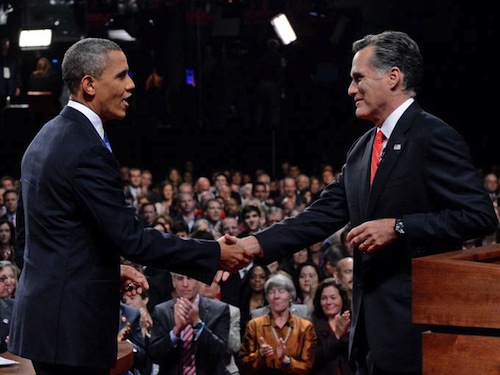
President Barack Obamas performance during the first presidential debate with Mitt Romney has been widely panned. Much of this criticism circulates around contrasts between style and substance.
Mitt Romney was certainly more energetic and upbeat, even if he also came out as a bully in his treatment of the moderator, Jim Lehrer. Yet throughout the debate, Romeny danced around his policy positions, trying to sound like a moderate who cares about the American middle class. The prevaricating was astounding — about his 5 trillion dollar plan to cut taxes, the implications that will have for exploding the deficit, bank re-regulation, and health coverage for pre-existing conditions. Romney may have won the debate on style, but he did not acquit himself well on matters of actual public policy.
Obama on the other hand was listless for reasons unknown to us. He may have been tired, or flumoxed by Romneys dissimulations, or something else. Whatever the reason, his was a very poor showing, especially his failure to tie Romney to his belief that 47% of Americans are free-loaders. To his credit, there were times when Obama was able to point out the inconsistencies in Romneys positions, especially when it came to cutting taxes for the wealthy while shifting the tax burden onto the poor and middle class. Nevertheless, he did not articulate his administrations achievements or plans in an intellectually or emotionally compelling manner.
In addition, there was something else that was missing. It was Obamas moral voice.
Obama is at his best when he embraces public policy as a moral enterprise, one that seeks to directly contribute to the well being of the public. His belief in the positive role of government in ensuring our common good is a case in point. So too is his critique of the vulture capitalism and extreme economic and social inequality represented by Romney and republican policy. More to the point, his moral commitment to the well being of all Americans, not just coddled plutocrats, grounds his arguments and provides clear and compelling justifications for his policy initiatives.
Some have dismissed this moral voice as soaring rhetoric. They are wrong. This is the language of ethics taking its proper place in the nations conversation. By framing questions and answers in terms of his moral core and commitments, Obama will go a long way to establishing the justification for his administration’s policies, as well as show citizens that he cares about their well being.
Next time around, Obama might do better by calling up his moral voice, and remembering to that public policy is “ethics writ large” (Plato).
Image: “Obama vs. Romney Debate”, USA Today, 03 October 2012.